One on One services
Speech Therapy
Private Sessions
(Available in person in Orcutt, CA or online)
One on One services
Speech Therapy
Private Sessions
(Available in person in Orcutt, CA or online)
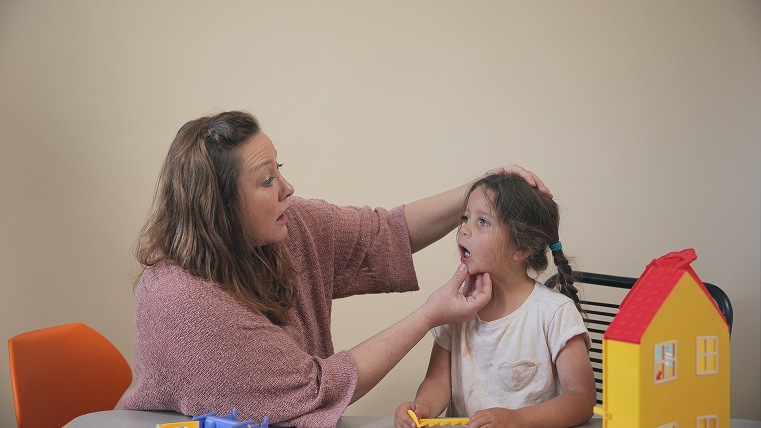
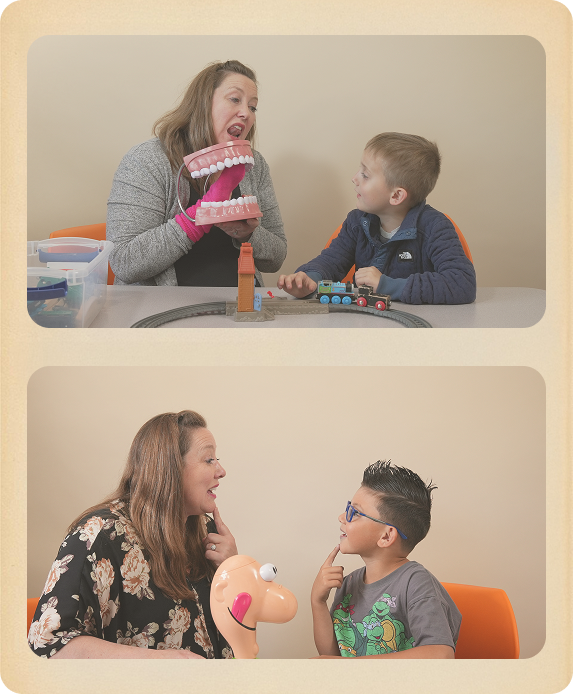
Introducing PROMPT Therapy
Prompts for Restructuring Oral Muscular Phonetic Targets.
A speech sound disorder is a communication disorder in which children have persistent difficulty saying words or sounds correctly. Most children make some mistakes while they learn to say new words, but a child who does not say sounds by their expected ages may have a speech sound disorder.
Only a certified Speech Language Pathologist is qualified to provide a differential diagnosis of speech sound disorders which include problems with articulation (sound production), phonology (sound patterns), Childhood Apraxia of Speech (deficits of motor planning) or physiological deficits (tongue thrust, dysarthria).
Speech Therapy is essential for children who are difficult to understand. Most children can say almost all sounds correctly by the age of 5. Articulation refers to how we produce specific sounds with our mouths. An articulation disorder can involve substitutions of one sound for another
(/w/ for /r/ as in “wabbit” for “rabbit.).
Phonology refers to how we use individual sounds in the context of language. Children with phonological disorders exhibit consistent patterns of sound
substitutions or omissions such as fronting “key” sounds like “tea.”
The more phonological patterns a child exhibits the more difficult they are to understand. If a 3-year-old isn’t able to be understood by strangers about 75% of the time (90-100% for 4 year olds), then a speech assessment should be recommended. Childhood apraxia of Speech is a motor speech disorder.
Children with Apraxia have problems saying sounds, syllables and words due to problems with motor planning movements needed for speech. The child knows what he or she wants to say but has difficulty
coordinating and planning the muscle movements necessary to say the words.
Children with Apraxia are extremely difficult to understand. A tongue thrust occurs when the tongue protrudes out of the mouth or against the back of the teeth when talking.
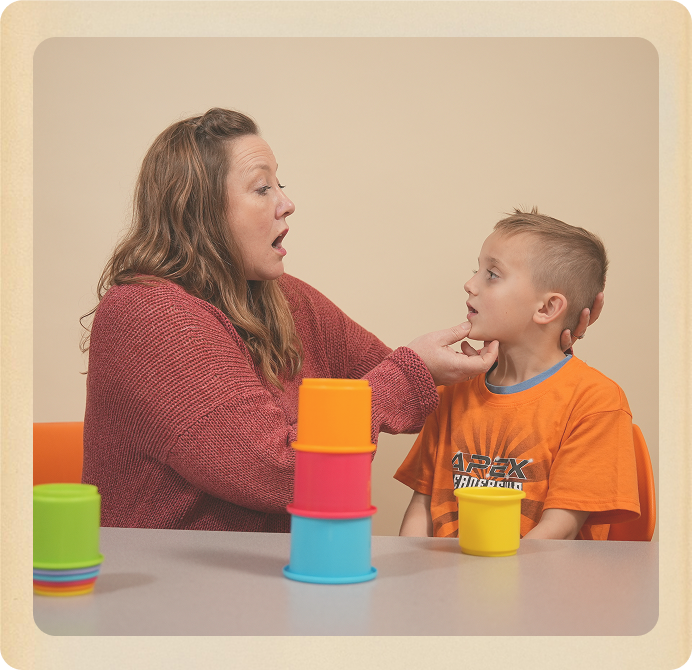
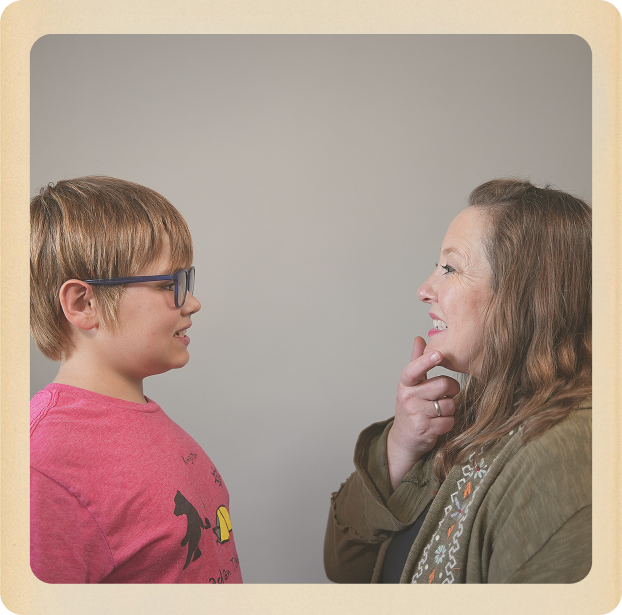
Children with a tongue thrust often present with errors such as lisping of /s/ and /z/. When a child can’t be understood it often results in uncontrollable tantrums or simply giving up.
A child can also be bullied or ridiculed for their speech errors which can cause social emotional wounding. Speech therapy can start as early as 18 months! Most commonly children are often seen between the ages of 3 and 8 for speech sound disorders.
Speech errors can also impact a child’s spelling. It is crucial that a child can express their wants, needs and ideas to anyone, anywhere at any time! If your child is hard to understand, schedule an evaluation to find out if your child has a speech sound disorder.
Speech therapy for young children is often play based and fun! The longer your child says phonemes (sounds) the wrong way, the harder it will be to change! Don’t delay, schedule the evaluation today!

Introducing PROMPT Therapy
Prompts for Restructuring Oral Muscular Phonetic Targets.
A speech sound disorder is a communication disorder in which children have persistent difficulty saying words or sounds correctly. Most children make some mistakes while they learn to say new words, but a child who does not say sounds by their expected ages may have a speech sound disorder.
Only a certified Speech Language Pathologist is qualified to provide a differential diagnosis of speech sound disorders which include problems with articulation (sound production), phonology (sound patterns), Childhood Apraxia of Speech (deficits of motor planning) or physiological deficits (tongue thrust, dysarthria).
Speech Therapy is essential for children who are difficult to understand. Most children can say almost all sounds correctly by the age of 5. Articulation refers to how we produce specific sounds with our mouths. An articulation disorder can involve substitutions of one sound for another
(/w/ for /r/ as in “wabbit” for “rabbit.).

Phonology refers to how we use individual sounds in the context of language. Children with phonological disorders exhibit consistent patterns of sound
substitutions or omissions such as fronting “key” sounds like “tea.”
The more phonological patterns a child exhibits the more difficult they are to understand. If a 3-year-old isn’t able to be understood by strangers about 75% of the time (90-100% for 4 year olds), then a speech assessment should be recommended. Childhood apraxia of Speech is a motor speech disorder.
Children with Apraxia have problems saying sounds, syllables and words due to problems with motor planning movements needed for speech. The child knows what he or she wants to say but has difficulty
coordinating and planning the muscle movements necessary to say the words.
Children with Apraxia are extremely difficult to understand. A tongue thrust occurs when the tongue protrudes out of the mouth or against the back of the teeth when talking.

Children with a tongue thrust often present with errors such as lisping of /s/ and /z/. When a child can’t be understood it often results in uncontrollable tantrums or simply giving up.
A child can also be bullied or ridiculed for their speech errors which can cause social emotional wounding. Speech therapy can start as early as 18 months! Most commonly children are often seen between the ages of 3 and 8 for speech sound disorders.
Speech errors can also impact a child’s spelling. It is crucial that a child can express their wants, needs and ideas to anyone, anywhere at any time! If your child is hard to understand, schedule an evaluation to find out if your child has a speech sound disorder.
Speech therapy for young children is often play based and fun! The longer your child says phonemes (sounds) the wrong way, the harder it will be to change! Don’t delay, schedule the evaluation today!
Ready to support your child’s
speech development?
Schedule a therapy session with Kellie today and discover the benefits of PROMPT therapy. Whether your child struggles with motor speech movements or requires specialized support, we’re here to help. Click the link below to secure your spot and start making progress!
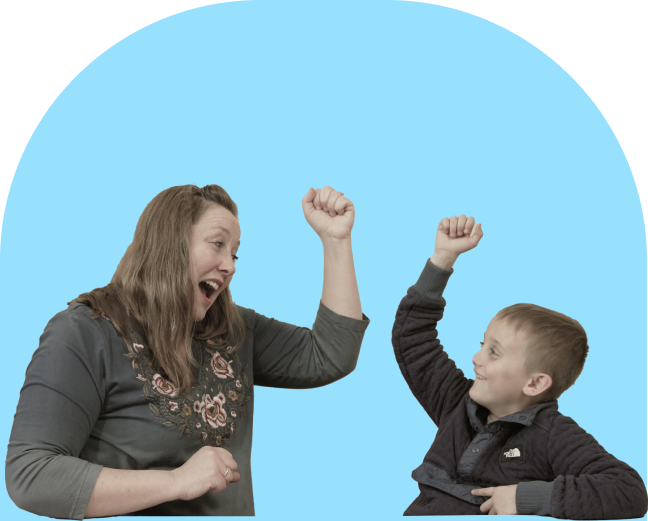
If you need help identifying your child’s unique needs, we offer private speech, language and educational evaluations which include Independent Education Evaluations which is paid by the public school district if approved. Go to Evaluations page.
Has the IEP team considered more frequent sessions for speech therapy to make meaningful progress? If not, schedule an Advocacy session today!
If you have any other questions, please visit the contact page
For Coaching & Conferences, we provide personalized sessions to help you navigate your child’s learning journey effectively.

